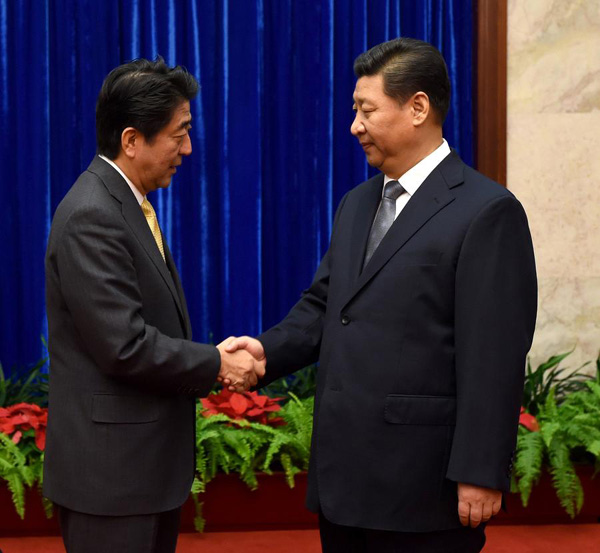 |
|
Chinese President Xi Jinping (R) and Japanese Prime Minister Shinzo Abe hold a meeting at the request of the Japanese side ahead of the 22nd Asia-Pacific Economic Cooperation (APEC) Economic Leaders' Meeting in Beijing, China, Nov 10, 2014. [Photo/Xinhua] |
President Xi Jinping called on Japan to honor its official remorse about wartime history and embark on trust-building measures in a meeting with Japanese Prime Minister Shinzo Abe at the Great Hall of the People on Monday.
The meeting, at Japan's request, took place a day after Abe arrived in Beijing to attend the 22nd Asia-Pacific Economic Cooperation (APEC) Economic Leaders' Meeting, from Monday to Tuesday.
Relations chilled over the Diaoyu Islands in September 2012 and this was the first time the leaders met in a scheduled setting.
Xi pointed out that "the right and wrong behind serious obstacles in the China-Japan relationship in the past two years is clear".
Japan's relations with China and South Korea experienced more turbulence in December 2013 when Abe visited Yasukuni, a shrine in Tokyo which honors the memory of 14 Class-A war criminals of WWII.
Xi underscored the fact that issues related to history are of deep concern to the Chinese people and must be addressed to ensure peace, stability and the region's development.
Only by honoring past official commitments and standing by the Murayama Statement can Japan develop a friendly and visionary relationship with its Asian neighbors, Xi said.
The Murayama Statement was issued by a former Japanese prime minister in 1995 acknowledging the suffering caused by the wartime Imperial army.
In response, Abe said:"The ruling Japanese administration will continue honoring the views regarding historical issues held by previous administrations."
The Chinese government attaches great importance to the relationship with Japan, and it upholds the idea of pressing ahead the development of the relationship in the spirit of "taking the history as a mirror and facing the future", Xi said.
China and Japan on Friday offered a preliminary sign of thaw in relations by agreeing on the four-point Principled Agreement on Handling and Improving Bilateral Relations.
The countries acknowledged in the agreement that "different positions exist between them" regarding the Diaoyu Islands and the East China Sea, and they agreed to set up maritime crisis-management mechanisms.
They also agreed to gradually resume political, diplomatic and security dialogue through various channels.
Abe said Japan is willing to implement the four-point consensus, and "properly handle the relevant issues".
Japan will "take this as a new starting point to press ahead the improvement and development of a Japan-China strategic and mutually beneficial relationship", Abe said.
Security issues in general were also raised during the talks.
Beijing lodged protests on a number of occasions after Tokyo directly or implicitly named China as a threat, such as in the annual Japanese defense policy white paper Defense of Japan over the past two years.
Abe said China's peaceful development signals an important opportunity for Japan and the world.
"Japan is determined to continue following the path of peaceful development," Abe said.
Xi said China and Japan are close neighbors, and the stable and healthy development of the relationship "is in the very best interests of both peoples and is the prevailing expectation of the international community".
Related:
China urges Japan to create good tone for meeting
